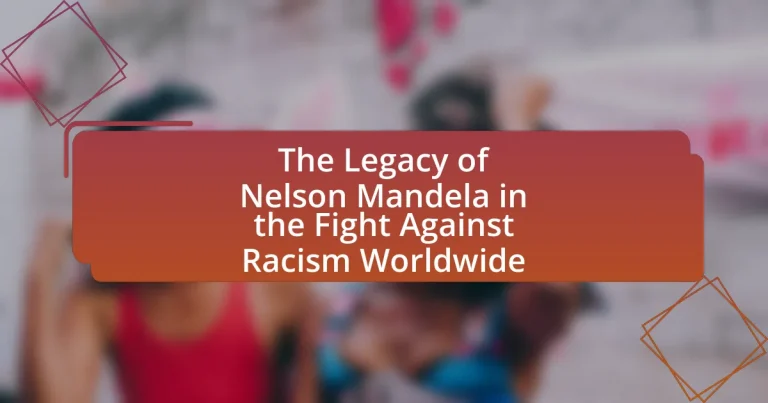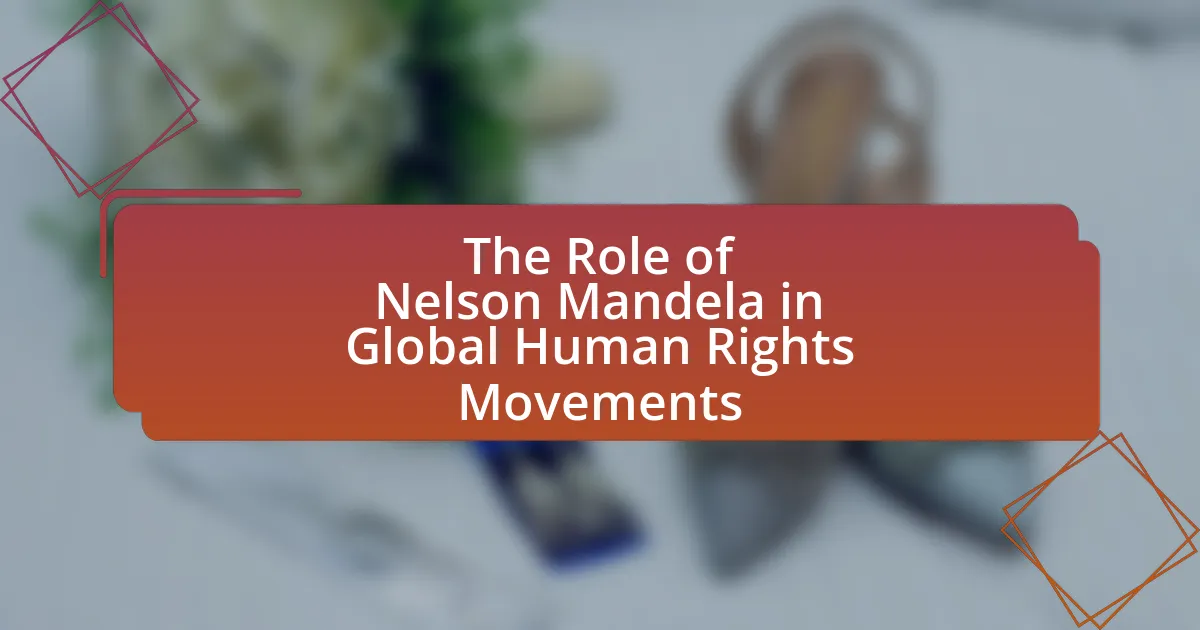Nelson Mandela’s legacy in the fight against racism worldwide is marked by his dedication to equality and justice, which inspired global movements against racial discrimination. His leadership in the anti-apartheid struggle and his election as South Africa’s first Black president in 1994 symbolize resistance to systemic racism. The article explores how Mandela’s early life, education, and key events shaped his understanding of racial injustice, as well as the impact of his imprisonment on global perceptions of racism. It also examines how his principles of reconciliation and non-violence continue to influence contemporary anti-racism movements and the ongoing challenges in combating racism today.

What is the Legacy of Nelson Mandela in the Fight Against Racism Worldwide?
Nelson Mandela’s legacy in the fight against racism worldwide is characterized by his unwavering commitment to equality and justice, which inspired global movements against racial discrimination. Mandela’s leadership in the anti-apartheid struggle in South Africa, culminating in his election as the country’s first Black president in 1994, served as a powerful symbol of resistance against systemic racism. His advocacy for reconciliation and forgiveness, exemplified in his establishment of the Truth and Reconciliation Commission, demonstrated a model for addressing historical injustices. Furthermore, Mandela’s influence extended beyond South Africa; he became a global icon for human rights, motivating activists and leaders worldwide to challenge racism and promote social justice. His famous quote, “For to be free is not merely to cast off one’s chains, but to live in a way that respects and enhances the freedom of others,” encapsulates his vision for a world free from racial oppression.
How did Nelson Mandela’s early life influence his views on racism?
Nelson Mandela’s early life significantly shaped his views on racism, particularly through his experiences in the racially segregated society of South Africa. Growing up in the Xhosa community, Mandela witnessed firsthand the systemic discrimination and oppression faced by black South Africans under apartheid. His exposure to the injustices inflicted upon his people, coupled with his education at institutions like the University of Fort Hare, where he encountered diverse political ideologies, deepened his understanding of racial inequality. Mandela’s early involvement in anti-colonial and African nationalist movements further solidified his commitment to fighting racism, as he recognized the need for collective action against oppressive systems. These formative experiences laid the groundwork for his lifelong dedication to dismantling apartheid and advocating for racial equality.
What experiences shaped Mandela’s understanding of racial injustice?
Nelson Mandela’s understanding of racial injustice was profoundly shaped by his experiences of systemic oppression in South Africa. Growing up in the racially segregated environment of the Eastern Cape, Mandela witnessed firsthand the discriminatory laws that marginalized black South Africans. His involvement in the African National Congress (ANC) in the 1940s further exposed him to the harsh realities of apartheid, as he participated in protests and campaigns against racial discrimination. Additionally, Mandela’s 27 years of imprisonment on Robben Island served as a crucible for his beliefs, where he encountered the brutalities of the apartheid regime and the resilience of fellow political prisoners. These experiences collectively informed his commitment to equality and justice, ultimately influencing his leadership in the anti-apartheid movement and his vision for a democratic South Africa.
How did Mandela’s education contribute to his anti-racist beliefs?
Mandela’s education significantly shaped his anti-racist beliefs by exposing him to diverse ideas and philosophies that challenged the status quo of apartheid. Attending the University of Fort Hare, a hub for African intellectuals, Mandela encountered influential thinkers and activists who advocated for equality and justice. This environment fostered his understanding of systemic racism and the importance of collective action against oppression. Additionally, his studies in law at the University of Witwatersrand further equipped him with the tools to analyze and combat racial discrimination, reinforcing his commitment to fighting for human rights and equality for all South Africans.
What were the key events in Mandela’s fight against racism?
Nelson Mandela’s fight against racism included key events such as the formation of the African National Congress Youth League in 1944, which aimed to mobilize young South Africans against apartheid. In 1960, after the Sharpeville Massacre, Mandela became a leader in the armed struggle against apartheid through Umkhonto we Sizwe, the military wing of the ANC. His arrest in 1962 led to a life sentence in 1964, during which he became a global symbol of resistance to racial oppression. Mandela’s release in 1990 marked a pivotal moment, leading to negotiations that culminated in the end of apartheid and his election as South Africa’s first Black president in 1994, solidifying his legacy as a champion against racism.
How did Mandela’s imprisonment impact the global perception of racism?
Mandela’s imprisonment significantly shifted global perceptions of racism by highlighting the injustices of apartheid and galvanizing international opposition to racial discrimination. His 27 years in prison became a symbol of the struggle against systemic racism, prompting worldwide protests and campaigns for his release, which drew attention to the broader issues of racial inequality. The global anti-apartheid movement, fueled by Mandela’s plight, led to economic sanctions against South Africa and increased awareness of the consequences of racism, ultimately contributing to the dismantling of apartheid in the early 1990s. This transformation in perception was evidenced by the widespread support for Mandela upon his release in 1990, as he emerged as a global icon for peace and reconciliation, further reinforcing the message that racism must be actively opposed.
What role did the anti-apartheid movement play in Mandela’s legacy?
The anti-apartheid movement was crucial in shaping Nelson Mandela’s legacy as a symbol of resistance against racial oppression. This movement galvanized international support, leading to widespread awareness of the injustices in South Africa and ultimately contributing to the dismantling of apartheid. Mandela’s leadership within the African National Congress and his imprisonment for 27 years became emblematic of the struggle for freedom, inspiring global activism and solidarity against racism. His eventual release in 1990 and subsequent election as South Africa’s first Black president in 1994 marked a significant victory for the anti-apartheid movement, solidifying his status as a global icon for human rights and equality.
How has Mandela’s legacy influenced global anti-racism movements?
Mandela’s legacy has significantly influenced global anti-racism movements by promoting the principles of equality, justice, and reconciliation. His leadership in dismantling apartheid in South Africa serves as a powerful example of how nonviolent resistance can lead to systemic change. The global anti-apartheid movement, which garnered international support, highlighted the importance of solidarity in combating racial injustice. Mandela’s emphasis on forgiveness and unity, particularly during his presidency, inspired movements worldwide to adopt similar approaches in their struggles against racism. His famous quote, “It is in your hands to make a better world for all who live in it,” continues to resonate, motivating activists to advocate for racial equality and social justice across various contexts.
What are the key principles of Mandela’s approach to fighting racism?
Nelson Mandela’s approach to fighting racism is grounded in the principles of equality, reconciliation, and non-violence. He emphasized the importance of treating all individuals with dignity and respect, advocating for equal rights regardless of race. Mandela believed in reconciliation as a means to heal the divisions caused by apartheid, famously stating that “forgiveness liberates the soul.” His commitment to non-violence was evident in his leadership style, promoting peaceful protests and dialogue over armed conflict. These principles were instrumental in dismantling institutionalized racism in South Africa and inspired global movements against racial discrimination.
How have other leaders drawn inspiration from Mandela’s legacy?
Other leaders have drawn inspiration from Mandela’s legacy by adopting his principles of reconciliation, forgiveness, and social justice in their own contexts. For instance, Barack Obama often cited Mandela as a guiding figure in his approach to leadership, emphasizing the importance of unity and understanding in overcoming division. Similarly, leaders like Angela Merkel and Justin Trudeau have referenced Mandela’s commitment to human rights and equality as a framework for their policies on immigration and social inclusion. Mandela’s ability to transform a nation through dialogue rather than violence serves as a powerful example for leaders worldwide, encouraging them to pursue peaceful resolutions to conflicts and advocate for marginalized communities.
What are the lasting impacts of Mandela’s legacy on contemporary society?
Nelson Mandela’s legacy has profoundly influenced contemporary society by promoting values of equality, justice, and reconciliation. His efforts in dismantling apartheid in South Africa serve as a global symbol for the fight against racial oppression, inspiring movements for civil rights and social justice worldwide. For instance, the establishment of the Nelson Mandela Foundation continues to advocate for human rights and social change, emphasizing education and community development as tools for empowerment. Furthermore, Mandela’s emphasis on forgiveness and dialogue has shaped conflict resolution strategies in various regions, demonstrating the effectiveness of peaceful negotiation over violence. His legacy is evident in ongoing global campaigns against racism, such as the International Day for the Elimination of Racial Discrimination, which reflects his enduring impact on societal values and policies aimed at fostering inclusivity and equality.
How does Mandela’s legacy continue to inspire current anti-racism efforts?
Mandela’s legacy continues to inspire current anti-racism efforts by exemplifying the principles of forgiveness, reconciliation, and social justice. His leadership in dismantling apartheid in South Africa serves as a powerful model for activists worldwide, demonstrating that systemic change is possible through peaceful means. For instance, the Truth and Reconciliation Commission, established under Mandela’s presidency, highlighted the importance of addressing historical injustices while fostering national unity. This approach has influenced contemporary movements, such as Black Lives Matter, which advocate for racial equality and justice by emphasizing dialogue and community engagement. Mandela’s emphasis on education and empowerment also resonates today, as many organizations focus on raising awareness and promoting understanding to combat racism effectively.
What organizations have been established in Mandela’s honor to combat racism?
Organizations established in Nelson Mandela’s honor to combat racism include the Nelson Mandela Foundation and the Nelson Mandela Children’s Fund. The Nelson Mandela Foundation focuses on promoting social justice and human rights, while the Nelson Mandela Children’s Fund aims to improve the lives of children and youth in South Africa. Both organizations actively work to address issues of inequality and racism, reflecting Mandela’s legacy of fighting against discrimination and advocating for equality.
How do educational programs incorporate Mandela’s teachings on racism?
Educational programs incorporate Mandela’s teachings on racism by emphasizing his principles of equality, justice, and reconciliation. These programs often include curricula that highlight Mandela’s life experiences, particularly his fight against apartheid, to illustrate the impact of systemic racism. For example, many educational institutions utilize Mandela’s quotes and writings, such as “No one is born hating another person,” to foster discussions on empathy and understanding among diverse student populations. Additionally, programs may engage students in community service projects that promote social justice, reflecting Mandela’s belief in active participation for change. Studies show that integrating Mandela’s teachings into educational frameworks enhances students’ awareness of racial issues and encourages critical thinking about societal structures, thereby reinforcing the importance of combating racism in contemporary society.
What challenges remain in the fight against racism today?
Challenges that remain in the fight against racism today include systemic inequality, social polarization, and the persistence of hate groups. Systemic inequality manifests in disparities in education, employment, and criminal justice, where racial minorities often face significant disadvantages. For instance, a 2020 report from the Economic Policy Institute highlighted that Black workers earn 73% of what their white counterparts make, illustrating economic disparities rooted in historical injustices. Social polarization is exacerbated by misinformation and divisive rhetoric, which can lead to increased tensions between racial groups. Additionally, hate groups have seen a resurgence, with the Southern Poverty Law Center reporting a rise in the number of active hate groups in the United States, indicating that extremist ideologies continue to pose a threat to racial harmony. These challenges underscore the ongoing struggle against racism, necessitating sustained efforts for equity and justice.
How do systemic issues perpetuate racism despite Mandela’s efforts?
Systemic issues perpetuate racism despite Mandela’s efforts through entrenched socio-economic disparities, institutional biases, and cultural norms that resist change. For instance, in South Africa, while Mandela’s leadership aimed to dismantle apartheid and promote equality, the legacy of economic inequality remains, with the World Bank reporting that over 50% of the population still lives in poverty, disproportionately affecting Black communities. Additionally, systemic racism is reinforced by policies and practices within law enforcement and education that continue to disadvantage marginalized groups, as evidenced by ongoing racial profiling and unequal access to quality education. These systemic barriers hinder the realization of true equality, demonstrating that Mandela’s efforts, while significant, are insufficient to overcome deeply rooted societal structures.
What role does social media play in modern anti-racism movements?
Social media serves as a crucial platform for modern anti-racism movements by facilitating rapid information dissemination, mobilizing supporters, and amplifying marginalized voices. It enables activists to share real-time updates, organize protests, and raise awareness about racial injustices, as seen during movements like Black Lives Matter, which gained momentum through hashtags and viral posts. Research indicates that social media campaigns can significantly increase public engagement and awareness, with studies showing that online activism can lead to offline participation, such as protests and community organizing. For example, the hashtag #BlackLivesMatter has been used millions of times, illustrating its effectiveness in uniting individuals globally against racism.
How can individuals contribute to the fight against racism in light of Mandela’s legacy?
Individuals can contribute to the fight against racism by actively promoting equality and justice, reflecting Nelson Mandela’s commitment to these principles. Engaging in community education initiatives, individuals can raise awareness about the impacts of racism and the importance of diversity, similar to Mandela’s efforts in advocating for human rights. Additionally, participating in peaceful protests and supporting anti-racist organizations can amplify voices against discrimination, echoing Mandela’s legacy of nonviolent resistance. Supporting policies that promote inclusivity and equity in workplaces and schools further aligns with Mandela’s vision for a just society. These actions collectively foster a culture of respect and understanding, essential in combating racism.
What actions can individuals take to honor Mandela’s legacy in their communities?
Individuals can honor Mandela’s legacy in their communities by actively promoting social justice and equality. Engaging in community service initiatives that support marginalized groups reflects Mandela’s commitment to fighting racism and inequality. For instance, volunteering at local organizations that provide education and resources to underprivileged communities aligns with Mandela’s belief in the power of education as a tool for change. Additionally, organizing or participating in awareness campaigns that address racial discrimination can foster dialogue and understanding, echoing Mandela’s efforts to unite people across divides. Supporting policies that promote inclusivity and advocating for human rights at local government meetings further exemplifies the actions individuals can take to honor his legacy.
How can education and awareness promote Mandela’s values against racism?
Education and awareness can promote Mandela’s values against racism by fostering understanding, empathy, and critical thinking among individuals. Educational programs that highlight Mandela’s life, his fight against apartheid, and his advocacy for equality can inspire individuals to challenge racist beliefs and behaviors. For instance, curricula that include discussions on human rights, social justice, and the impact of racism can empower students to recognize and confront discrimination in their communities. Research shows that education significantly reduces prejudice; a study published in the Journal of Social Issues found that educational interventions can lead to increased tolerance and reduced bias. By instilling Mandela’s principles of respect and dignity for all, education and awareness can create a more inclusive society that actively opposes racism.
What are effective ways to engage in dialogue about racism inspired by Mandela?
Effective ways to engage in dialogue about racism inspired by Mandela include fostering open communication, promoting empathy, and encouraging active listening. Mandela emphasized the importance of dialogue as a means to bridge divides and build understanding among diverse groups. For instance, he famously stated, “It is in your hands to make a better world for all who live in it.” This highlights the necessity of individual responsibility in addressing racism. Additionally, creating safe spaces for discussions allows participants to share personal experiences and perspectives, which can lead to greater awareness and understanding of systemic issues. Mandela’s approach to reconciliation in South Africa serves as a model, demonstrating that constructive dialogue can lead to healing and progress in combating racism.
What resources are available for those looking to learn more about Mandela’s impact on racism?
Books, documentaries, and academic articles are key resources for learning about Nelson Mandela’s impact on racism. Notable books include “Long Walk to Freedom,” Mandela’s autobiography, which details his experiences and views on racial injustice. Documentaries like “Mandela: Long Walk to Freedom” provide visual insights into his life and activism. Academic articles, such as “Nelson Mandela and the Politics of Race” by David M. Anderson, published in the Journal of Southern African Studies, analyze his influence on anti-racism movements. These resources collectively offer comprehensive perspectives on Mandela’s legacy in combating racism.
Which books and documentaries provide insight into Mandela’s fight against racism?
Books that provide insight into Nelson Mandela’s fight against racism include “Long Walk to Freedom,” Mandela’s autobiography detailing his life, struggles, and the anti-apartheid movement. Another significant book is “Mandela: The Authorized Biography” by Anthony Sampson, which offers an in-depth look at Mandela’s political journey and his role in combating racial injustice.
Documentaries such as “Mandela: Long Walk to Freedom,” based on his autobiography, visually narrate his fight against apartheid and racism. Additionally, “The Last Days of Apartheid” provides historical context and showcases Mandela’s impact on the anti-apartheid struggle. These works collectively illustrate Mandela’s commitment to ending racial discrimination and promoting equality.
How can online platforms facilitate discussions about Mandela’s legacy?
Online platforms can facilitate discussions about Mandela’s legacy by providing accessible forums for diverse voices to share perspectives and engage in dialogue. These platforms, such as social media, blogs, and discussion forums, enable users to post content, comment, and interact in real-time, fostering a global conversation about Mandela’s impact on anti-racism efforts. For instance, the hashtag #MandelaDay on Twitter encourages users to reflect on his contributions and share related initiatives, amplifying awareness and inspiring action. Additionally, online platforms can host webinars and virtual events featuring experts and activists, allowing for deeper exploration of Mandela’s principles and their relevance today. This democratization of information and dialogue helps to educate a wider audience about the ongoing fight against racism, rooted in Mandela’s legacy.




